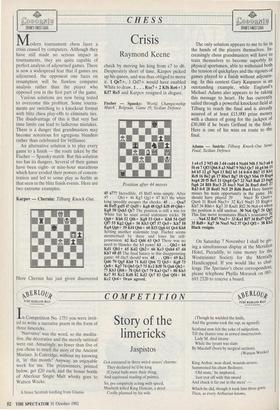Crisis
Raymond Keene
Modern tournament chess faces a crisis caused by computers. Although they have still made no serious impact in tournaments, they are quite capable of perfect analysis of adjourned games. There is now a widespread fear that if games are adjourned, the opponent one faces on resumption will be flawless computer analysis rather than the player who opposed you in the first part of the game.
Various solutions are now being tested to overcome this problem. Some tourna- ments are switching to a knockout format with blitz chess play-offs to eliminate ties. The disadvantage of this is that very fast time limits can lead to ludicrous mistakes. There is a danger that grandmasters may become notorious for egregious blunders rather than celebrated for brilliance.
An alternative solution is to play every game to a finish — the route taken by the Fischer — Spassky match. But this solution too has its dangers. Several of their games have been eight- or nine-hour marathons which have eroded their powers of concen- tration and led to some play as feeble as that seen in the blitz finish events. Here are two extreme examples.
Karpov — Chemin: Tilburg Knock-Out.
Here Chernin has just given discovered check by moving his king from c7 to d6. Desperately short of time, Karpov picked up his queen, and was thus obliged to move
it. 1 Qe7+. 1 Qd7+ would have enabled White to draw. 1 . . . Rxe7+ 2 Kf6 Re6+! 3. Kf7 Re5 and Karpov resigned in disgust.
Fischer — Spassky: 'World Championship Match', Belgrade, Game 19; Sicilian Defence.
Position after 44 moves 45 a7?? Incredible. 45 Bxf5 wins simply. After 45 . . . Qhl+ 46 Kg3 Ogl + 47 Kf3 the white king speedily escapes the checks. 45 . . . Qxa7 46 Bxf5 gxf5 47 Qxf5 + Kg8 48 Qg5 Kf8 49 Qh6+ Kg8 50 QxhS Qc7 The position is still a win for White but he must avoid stalemate tricks. 51 Qg6+ Kh8 52 Qf6+ Kg8 53 Qe6+ Kh8 54 Qd5 Qf7 55 Kg2 Qg6+ 56 Kh3 Qf7 57 Qe5+ Kh7 58 Kg4 Qg6+ 59 Kf4 Qh6+ 60 Kf3 Qg6 61 Qe4 Kh8 Setting another stalemate trap. Fischer seems mesmerised by these and loses his self- possession. 62 Keg Qd6 63 Qe3 There was no need to blunder the h4 pawn! 63 . . . Qh2+ 64 Kdl Qhl+ 65 Kd2 Qh2+ 66 Kc3 Qxh4 67 d4 Kh7 68 d5 The final lunacy in this disappointing game; 68 dxe5 should win. 68 . . . Qf6+ 69 Kc2 Qd6 70 Qg5 Kh8 71 Kd2 Qb6 72 Qe5+ Kg8 73 QeS+ Kg7 74 Qb5 Qc7 75 Kc2 Kf8 76 Qa6 Qh2+ 77 Kb3 Qb8+ 78 Qb5 Qc7 79 Ka3 Qa7+ 80 Kb3 Ke7 81 Kc2 Kd8 82 Kd2 Qc7 83 Qa6 Qf4+ 84 Kc2 Qe4+ Draw agreed.
The only solution appears to me to lie in the hands of the players themselves. In- creasingly chess grandmasters will have to train themselves to become superbly fit physical sportsmen, able to withstand both the tension of quickplays and the rigours of games played to a finish without adjourn- ing. In this context Gary Kasparov is an outstanding example, while England's Michael Adams also appears to be taking this message to heart. He has currently sailed through a powerful knockout field at Tilburg to reach the final and is already assured of at least £15,000 prize money with a chance of going for the jackpot of £30,000 if he beats Gelfand in the final. Here is one of his wins en route to the final.
Adams — Smirin: Tilburg Knock-Out Semi- Final; Sicilian Defence.
1 e4 c5 2 Nf3 d6 3 d4 cxd4 4 Nxd4 Nf6 5 Nc3 a6 6 f4 e6 7 Qi3 Qb6 8 a3 Nbd7 9 Nb3 Qc7 10 g4 h6 11 h4 h5 12 g5 Ng4 13 Bd2 b5 14 0-0-0 Bbl 15 101 Rc8 16 Be2 g6 17 Rhel Bg7 18 Qg3 Nb6 19 Bxg4 hxg4 20 f5 Be5 21 Qxg4 Qe7 22 Na5 Ba8 23 fxg6 fxg6 24 Bf4 Rxc3 25 bxc3 Na4 26 Bxe5 dxe5 27 Rd3 0-0 28 Redl Nc5 29 Rd6 Bxe4 Here Smirin misses his main opportunity in the game. He should have played 29 . . . Nxe4 30 Qxe6+ Qxe6 31 Rxe6 Nxc3+ 32 Kcl Nxdl 33 Rxg6+ Kh7 34 Rh6+ Kg7 35 Kxdl Rf2 36 Nc6 e4 when the position is still unclear. 30 Nc6 Qg7 31 QB1 This fine move terminates Black's resistance 31 . . . Na4 32 Rd7 Nxc3+ 33 Kal Rf7 34 Rxf7 Q117 35 Rd8+ Kg7 36 NxeS Ne2 37 Qe3 Qfl + 38 Kb2 Black resigns.
On Saturday 7 November I shall be giv-
ing a simultaneous display at the Meridien Hotel, Piccadilly, to raise money for the Westminster Society for the Mentally Handicapped. If you would like to chal- lenge The Spectator's chess correspondent, please telephone Phyllis Moravek on 081-
693 2320 to reserve a board.


























































 Previous page
Previous page